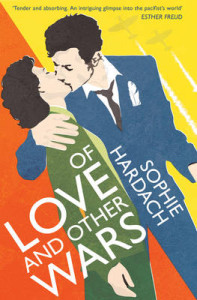 There’s an awful lot of war around at the moment. Sadly, the real kind is always with us but it seems to be more widespread in fiction than usual, an inevitable result of the First World War centenary I suppose. Having already reviewed Anna Hope’s Wake and Helen Dunmore’s The Lie I’d sworn off war novels for a few months but Sophie Hardach’s Of Love and Other Wars caught my eye. I’d enjoyed her first novel so much that I dodged my own rule – already broken as I’d started Pat Barker’s Toby’s Room which is excellent but I’m sure you’ve read more than enough reviews of that to want another. Hardach’s novel is about the Second rather than the First World War and although, as you’d expect from its title, there are number of love stories running through it, its central theme is unusual: conscience and pacifism.
There’s an awful lot of war around at the moment. Sadly, the real kind is always with us but it seems to be more widespread in fiction than usual, an inevitable result of the First World War centenary I suppose. Having already reviewed Anna Hope’s Wake and Helen Dunmore’s The Lie I’d sworn off war novels for a few months but Sophie Hardach’s Of Love and Other Wars caught my eye. I’d enjoyed her first novel so much that I dodged my own rule – already broken as I’d started Pat Barker’s Toby’s Room which is excellent but I’m sure you’ve read more than enough reviews of that to want another. Hardach’s novel is about the Second rather than the First World War and although, as you’d expect from its title, there are number of love stories running through it, its central theme is unusual: conscience and pacifism.
Beginning in 1937, Hardach’s novel takes her characters up to the day the war in Europe ends in 1945. Paul and Charlie Lamb are Quakers, the sons of a father imprisoned in the First World War for his conscientious objection. One year older than Paul, Charlie is sure of himself and his pacifist beliefs, pressing Peace News on all who will read it but a reluctant Quaker for all that. Paul, less articulate, is more muddled in his thinking and finds his pacifism challenged by Miriam Morningstar, the daughter of his Jewish statistics teacher who is called back to the lab where she worked as a crystallographer decades ago to analyse the effects of the bombing campaigns. Paul and Charlie’s friend Grace works with kindertransport children alongside Max, a Jewish refugee from Vienna who is lodging with the Morningstars. As the war unfolds Hardach explores the moral dilemmas of war and pacifism through these characters and their stories.
If this sounds a little clunky that’s my fault: Hardach’s novel most certainly isn’t. Indeed, she’s a master of subtlety in the ‘show, don’t tell’ tradition. Max gently corrects Grace’s rebuke of his apparently draconian approach to the children’s table manners explaining that he is only trying to do what their parents would have wanted for them. Paul and Charlie each take a different stand, both equally challenging and courageous, while Miriam’s passionate determination to do something for the war effort is later counterbalanced by her mother’s guilt at cheering her brothers off to the last war and her work in this one. It’s a novel with serious themes but it’s also a story well told. Hardach’s characters are vividly real, and her treatment of them compassionate. A box of tissues might come in handy.


This was another one I flicked through this afternoon, but I’m trying to avoid war books so I didn’t go any further. It wasn’t helped by the news this morning that the RSC are going to stage both ‘Loves Labours Lost’ and ‘Much Ado About Nothing’ later this year with wartime settings. Now your review has really peeked my interest and I think I may have to add it to the list of books I’m thinking about. Or perhaps I could go back and look out Hardach’s previous novel if that was so good. She’s not an author I’ve heard of before.
I quite understand the war novel avoidance – I’m beginning to wish I hadn’t started Toby’s Room. I think that will be the last one for a while. I loved The Registrar’s Manual of Forced Marriages, well worth seeking out.